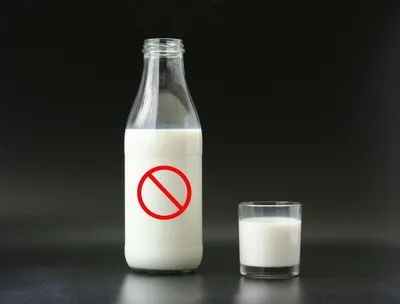I have a confession to make. No I’m not a vegetarian or a closet smoker. However, and you might judge me for this admittance—I’m not down with cow dairy!
While small servings of goat cheese are totally fine, if someone sneaks the tiniest bit of heavy cream, milk, ice cream, butter, or cheeses from the moo-cow into my food, my body suffers a reaction that just isn’t pretty!
I have a casein allergy.
1. What is Casein Allergy?
While I—like the vast majority of the population—blamed lactose for what I just assumed was a straight-forward case of food intolerance. It was actually casein, one of the milk proteins (along with whey) that caused painful inflammation of my belly and respiratory system, itchy hives, tingling lips, headache, neck and shoulder aches, fatigue, and even puffy and irritated eyes to come on suddenly.
2. Casein Allergy vs. Lactose Intolerance
So while a person with a lactose intolerance lacks the necessary enzyme needed to digest the lactose in milk; a person (like me) with a casein allergy suffers an immediate and pretty severe immune reaction to the casein in milk, which causes a severe and misguided immune system response as the body tries to protect itself against the foreign substance or threat.
3. When Is Casein Allergy Developed?
The majority of food allergies, particularly to cow’s milk, first display reactions to the allergen during infancy. Many children are lucky enough to outgrow the severity of their symptoms when they reach adulthood, but a unlucky majority must learn to live without milk for life.
4. What Happens If I Eat Foods Containing Casein?
Individuals with a true casein allergy experience symptoms as the immune system attacks the allergen and emits allergic (IgE) antibodies and histamines for protection.
5. The Immune Response
The immune system, believing it needs to protect the body from a virus or foreign germ, triggers the release of body chemicals, called histamine, the trigger the actual negative symptoms associated with a food allergy reaction.
6. Common Symptoms of Casein Allergy
Within minutes of consuming casein, the most common symptoms include:
- Swelling of the lips, the tissues inside the mouth, and the tongue
- Restriction of the throat, nasal congestion, coughing, chest pain, and breathing difficulties
- Itchy hives, red blotchy skin, or skin rash
- Runny nose, watery, and irritated eyes

7. Anaphylaxis with Casein Allergy
The most terrifying and life-threatening symptoms of consuming cow’s milk for those with a casein allergy is anaphylaxis. The restriction of the airways can come on rapidly, and for those who already suffer asthma, emergency response is imperative.
8. For Serious Casein Allergies…
For severe milk or casein allergies, your doctor will prescribe injectable epinephrine (or an Epi Pen) to carry with you at all times. If you consume casein accidently, you or a loved one can administer the epinephrine injection to save you time and counteract the reaction until emergency help arrives.
9. For Milder Casein Allergies…
Your doctor may recommend carrying over-the-counter antihistamines with you. These will calm the immune response and alleviate allergy reactions if you accidently ingest a food containing casein.
10. Say Goodbye to Cow’s Milk
The best prevention for a casein allergy is to avoid cow’s milk altogether. That means maintaining a strict casein-free diet and avoiding all foods and beverages that contain cow’s milk—such as cheese, breads or baked goods made with milk, cream soups and sauces, butter, coffee creamer, ice cream, certain icings, and milk-based spreads. Luckily, you can still consume rich sources of calcium from calcium-added juices, cereals, almond and soy milk, and veggies like kale, spinach, Swiss chard, and broccoli.












